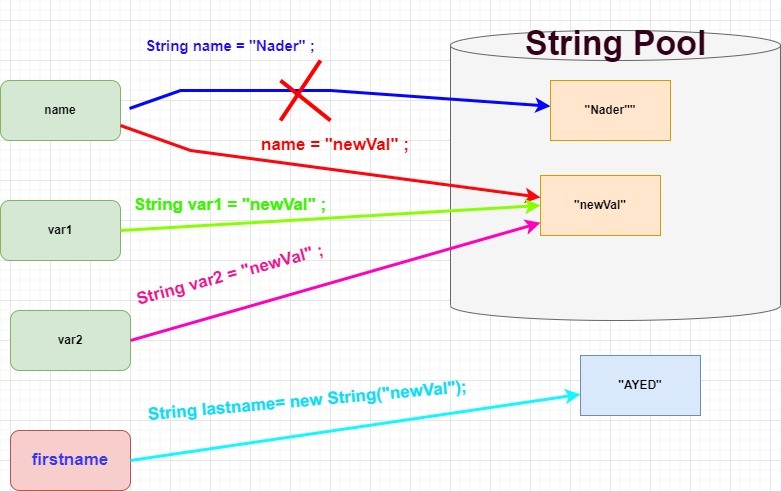Checking Out the Advantages of Unalterable Strings in Modern Programs Paradigms
In the realm of modern programming paradigms, the principle of unalterable strings stands as a cornerstone of robust software application development. By taking on unalterable strings, programmers can make certain enhanced data integrity, improved thread safety, simplified debugging processes, enhanced protection measures, and effective efficiency optimization.
Enhanced Data Honesty

By preventing the alteration of string objects, immutability eliminates the threat of unintentional changes to the information they hold. This not just enhances the security of the details but also enhances the integrity of the code that depends on these strings.
Immutability likewise sustains safer multithreading atmospheres, as simultaneous accessibility to immutable strings does not posture the risk of data corruption via simultaneous adjustments. This building streamlines the process of dealing with strings in parallel programming situations.
In essence, immutability acts as a protective guard around the data stored within strings, improving their honesty by guaranteeing that when specified, their worths remain unchanged throughout the program's implementation.

Enhanced String Safety And Security
Unalterable strings enhance the thread safety of programs by making certain that when a string item is created, its value can not be modified. This property gets rid of the risk of simultaneous threads attempting to change the exact same string simultaneously, which could result in data corruption or irregular states in the program - Why are strings immutable in Java?. In a multi-threaded environment, where multiple threads accessibility and control information all at once, the immutability of strings provides a level of safety by guaranteeing that the information stays unchanged throughout its lifecycle
Simplified Debugging Processes
Offered the boosted thread safety and security helped with by unalterable strings, a significant advantage occurs in the realm of simplified debugging procedures. Unalterable strings, as soon as created, can not be altered, making it much easier to map the circulation of data and determine the source of pests in a program. This immutability makes certain that strings stay regular throughout the implementation of the program, lowering the possibility of unanticipated modifications that can lead to mistakes.
When debugging with mutable strings, programmers often run into issues where a string's value is modified inadvertently, making it challenging to identify the origin reason of a bug. However, with immutable strings, the data remains the same, enabling developers to concentrate on assessing the real reasoning of the code instead of locating where and when a string was changed incorrectly.
Additionally, immutable strings simplify the debugging process by allowing much easier recreation of insects. Considering that unalterable strings do not transform state, programmers can recreate and study insects more effectively, bring about quicker recognition and resolution of problems within the codebase. This structured debugging process inevitably adds to higher software program quality and boosted total advancement efficiency.

Increased Protection Actions
Enhancing information security and fortifying system integrity, the application of unalterable strings in software application applications contributes substantially to raised safety and security procedures. Immutable strings, once created, can not be customized, supplying a crucial defense against harmful meddling or unapproved gain access to. By guaranteeing that sensitive data kept in strings remains unchanged throughout the program's implementation, the threat of information breaches or shot strikes is considerably lowered. Why are strings immutable in Java?. Immutable strings also play a vital duty in preventing common protection susceptabilities such as barrier overflows and SQL injection assaults, as efforts to adjust string information at runtime are inherently restricted.
Additionally, the immutability of strings enhances the predictability of program habits, making it less complicated to verify check it out inputs and stop unanticipated modifications that can compromise protection. This predictability simplifies the process of auditing and validating code, making it possible for programmers to identify potential safety and security technicalities better. Overall, integrating unalterable strings into software application development techniques not only improves the robustness and dependability of applications however likewise reinforces their strength versus security dangers.
Reliable Performance Optimization
When dealing with mutable strings, operations like concatenation or substring development typically result in the development of new string things, a knockout post leading to memory overhead and increased handling time. By allowing strings to remain stable and consistent, unalterable strings facilitate better memory administration and caching chances, ultimately increasing the overall performance of the software.
Considering that unalterable strings can not be customized when developed, they can be shared across threads without the risk of unforeseen changes, reducing the requirement for synchronization devices and improving concurrency. Immutable strings simplify debugging procedures as designers can rely on that a string's worth will continue to be consistent throughout the program's implementation, getting rid of prospective mistakes triggered by mutable state adjustments.
Final Thought
To conclude, the benefits of making use of unalterable strings in modern programming paradigms can not be overstated. Enhanced data stability, enhanced string safety and security, simplified debugging processes, boosted safety and security actions, and efficient efficiency optimization all add to the overall efficiency of programs tasks. By including unalterable strings right into programs practices, designers can gain from a much more trusted and robust codebase.
Immutability, a crucial function of strings in programming languages such as Java and Python, makes certain that as soon as a string item is produced, it can not be modified or customized.Immutable strings improve the thread security of programs by making certain that when a string item is developed, its value can not be customized. Immutable strings likewise play an important role in description protecting against usual protection vulnerabilities such as barrier overflows and SQL shot attacks, as attempts to adjust string information at runtime are inherently restricted.
By allowing strings to stay consistent and unchangeable, immutable strings facilitate much better memory administration and caching possibilities, ultimately enhancing the total effectiveness of the software application.
Unalterable strings simplify debugging procedures as programmers can trust that a string's worth will stay regular throughout the program's execution, eliminating possible errors triggered by mutable state modifications.